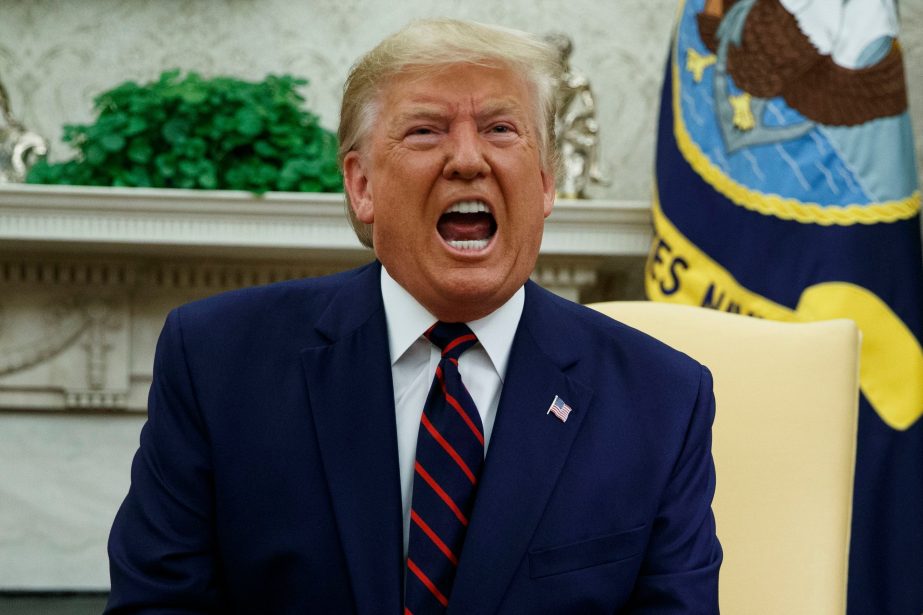
President Donald Trump doubled down Sunday on his push for the use of an anti-malarial drug against the coronavirus, issuing medical advice that goes well beyond scant evidence of the drug’s effectiveness as well as the advice of doctors and public health experts.Trump’s recommendation of hydroxychloroquine, for the second day in a row at a White House briefing, was a striking example of his brazen willingness to distort and outright defy expert opinion and scientific evidence when it does not suit his agenda.Standing alongside two top public health officials who have declined to endorse his call for widely administering the drug, Trump suggested that he was speaking on gut instinct and acknowledged that he had no expertise on the subject.Saying that the drug is “being tested now,” Trump said that “there are some very strong, powerful signs” of its potential, although health experts say that the data is extremely limited and that more study of the drug’s effectiveness against the coronavirus is needed.“But what do I know? I’m not a doctor,” Trump added“If it does work, it would be a shame we did not do it early,” Trump said, noting again that the federal government had purchased and stockpiled 29 million pills of the drug. “We are sending them to various labs, our military, we’re sending them to the hospitals.” Trump, who once predicted that the virus might “miraculously” disappear by April because of warm weather, and who has rejected scientific consensus on issues like climate change, was undaunted by sceptical questioning. “What do you have to lose?” Trump asked, for the second day in a row, saying that terminally ill patients should be willing to try any treatment that has shown some promise. When a reporter at Sunday’s briefing asked Dr Anthony Fauci, the director of the National Institute of Allergy and Infectious Diseases, to weigh in on the subject, Trump stopped him from answering. As the reporter noted that Fauci, who has been far more sceptical about the drug’s potential, was the president’s medical expert, Trump made it clear he did not want t“You know how many times he’s answered that question? Maybe 15 times,” the president said, stepping toward the lectern where Fauci was standing.Even as Trump has promoted the drug, which is also often prescribed for patients with lupus, it has created rifts within his own coronavirus task force. And while many hospitals have chosen to use hydroxychloroquine in a desperate attempt to treat dying patients who have few other options, others have noted that it carries serious risks. In particular, the drug can cause a heart arrhythmia that can lead to cardiac arrest. Dr Megan L Ranney, an emergency physician at Brown University in Rhode Island, said in an interview Sunday night that she had never seen an elected official advertise a miracle cure the way Trump has. “There are side effects to hydroxychloroquine,” Ranney said. “It causes psychiatric symptoms, cardiac problems and a host of other bad side effects.” Ranney said that the drug could be effective for some patients, but that there was not nearly enough scientific evidence to support Trump’s claims. “There may be a role for it for some people,” she said, “but to tell Americans ‘you don’t have anything to lose,’ that’s not true. People certainly have something to lose by taking it indiscriminately.” Hydroxychloroquine has not been proved to work against COVID-19 in any significant clinical trials. A small trial by Chinese researchers made public last week found that it helped speed the recovery in moderately ill patients, but the study was not peer-reviewed and had significant limitations. Earlier reports from France and China have drawn criticism because they did not include control groups to compare treated patients with untreated ones, and researchers have called the reports anecdotal. Without controls, they said, it is impossible to determine whether the drugs worked.But Trump on Sunday dismissed the notion that doctors should wait for further study.“We don’t have time to go and say, ‘Gee, let’s take a couple of years and test it out,’ and let’s go out and test with the test tubes and the laboratories,” Trump said. “I’d love to do that, but we have people dying today.”Trump is typically joined at his briefings by top medical advisers, including Fauci and Dr Deborah L Birx, his coronavirus coordinator. But the president does most of the talking, and has told several advisers that the briefings give him free airtime and good ratings.

